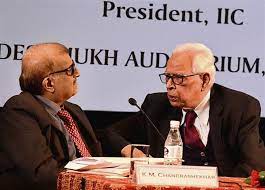NEW DELHI: Former Jammu and Kashmir Governor NN Vohra on Monday called for increasing the size and strength of the All India Services to better serve a growing population in a diverse nation like India, where problems are surging rather than diminishing.
Lauding the civil services for holding the country together, Vohra said it was not justifiable for public servants to be blamed entirely for failures of governance because constitutionally, the larger responsibility of governance rests with the elected persons.
The former Governor was speaking at the India International Centre here on the occasion of the BG Deshmukh Lecture on Governance, 2023, delivered by former Cabinet Secretary KM Chandrasekhar, who argued for government systems at the Centre and states to be driven by outcomes on the lines of the corporate sector. IIC president Shyam Saran chaired the event.
Vohra, in his remarks, warned against dilution of crucial institutions like CAG, CBI, ED and Central Information Commission and said these structures must be led by people of unquestioned reputation.
“We have, as a country, a very bright future. We can look ahead. Let us not spend our available resources to destroy structures built over 75 years, and I am particularly concerned about the health of crucial institutions of governance like CAG, ED and CBI. If we dilute the functioning of these key institutions, we are heading for trouble as the foundation of democracy could shake and people’s trust in institutions get eroded,” Vohra said.
He earlier recalled as “phenomenal” the work of nation-building, which the Indian civil services accomplished between 1950 and 1975, and said a large part of the country had been held together by the civil services.
“Seven and a half decades have passed and we have faced five-six wars, many internal disorders and serious economic problems. And here we are doing very well. We are in world news for one reason or the other. A large part of holding the country together has been the contribution of the civil servants,” Vohra said, arguing that just about 5,000 civil services cadre strength for a country of 140 crore people was miniscule.
“If you look at the enormity of challenge the civil servants face in a country of our size, you will realise that we do not need to waste time in laying blame on a system which is basically answerable to politicians,” said Vohra, adding the all-India size and strength should be raised and new recruits allowed to choose areas for specialisation.
Delivering the BG Deshmukh lecture, Chandrasekhar said the government, both at the Centre and states, should adopt result framework documents to measure their performance at the end of every year.
Noting that Australia, New Zealand and Canada were doing this, the former Cabinet Secretary said outcome-based approach should be unique to each state.
“NITI Aayog can work as a link between the Centre and the states and the outcome documents of both can be linked to achieve the desired results,” Chandrasekhar noted. He batted for cooperative rather than competitive federalism citing data that suggests how 15 districts of India account for 50 per cent of the GDP.
“Initial conditions are not fertile for competitive federalism,” Chandrasekhar said, speaking on corporate governance and public administration.


